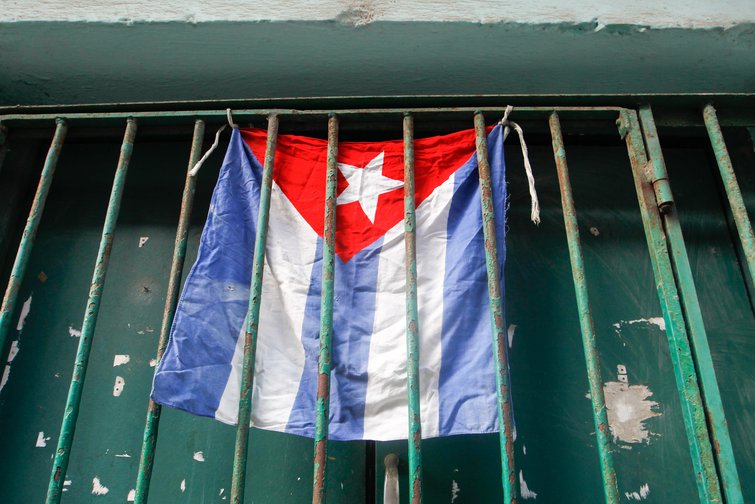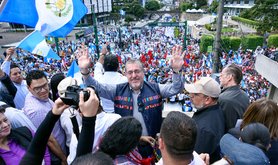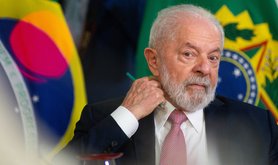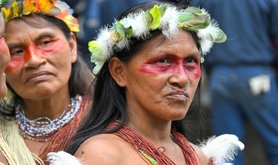
Trapped in Cuba

In Cuba, changes were expected. The economic liberalization brought about by Raúl Castro established different types of ownership, the empowerment of the self-employed, and the reestablishment of diplomatic relations with the United States in 2014, encouraged ideas of political changes.
The reform of the Constitution that was adopted on 24 February 2019, recognized - without relinquishing the primacy of the Communist Party and the socialist model of public management - reforms that incorporated limits to a president's term in office to two consecutive five-year terms, while setting the age for election as president at 60, empowering governors and creating a National Electoral Council. Private property and the promotion of foreign investment are now recognized. The text also expands the protection of human rights and constitutional guarantees. Regulations for this new legislation are still lacking, and meanwhile, political persecution is increasing and there is a constant threat to freedom of expression and movement.
In recent years there has been an increase in the numbers of unwarranted arrests of independent journalists, artists or social activists, as well as an increase in the number of obstacles to mobilize for meetings and gatherings at the local, national or international level, and imprisonments without trial.
What shields the government from international shaming is that - in Cuba - human rights violations are not widespread. There is no evidence of disappearances or genocide. We believe that this explains why the complaints by the Inter-American Commission on Human Rights (IACHR), Human Rights Watch, Reporters Without Borders, Cuban tweeters and the independent press - about the persistent restrictions on political rights, assembly, association, and freedom of expression - hasn’t caused Latin American or European countries to mobilise and thus, it does not prevent arbitrary detentions or house arrests
We’ve got a newsletter for everyone
Whatever you’re interested in, there’s a free openDemocracy newsletter for you.
While for the first time the 2019 Constitution includes the term human rights and states that people cannot be subjected to forced disappearance, torture or cruel punishments (article 51), that they are free to enter, remain, transit and leave the national territory (article 52), and that the State recognizes, respects and guarantees freedom of thought, conscience and expression (article 54), the reality demonstrates that citizens suffer harassment, intimidation and arbitrary detention on a daily basis. The authorities are partial and opaque about the causes of the convictions.
An increasingly common example is the case of the “regulados”. This legal "figure" allows authorities to restrict the free movement of activists, journalists and political opponents in general. This is not based on any legal restriction or document that justifies making it impossible to travel outside of Cuba. It is a verbal threat that isn’t supported by legal regulation nor by a judicial process. It is a paralyzing warning that some citizens receive when they go through immigration.
According to the Cuban Human Rights Observatory, more than 200 arbitrary detentions were recorded in January 2020.
The Cuban constitution doesn’t establish this as a criminal offence, nor does the Migration Act (Act No. 1312). In fact, this “regulation” is based on a concept found within the penal code, which establishes the dangers of pre-criminal activity and makes it possible to detain someone or punish a crime before it is even committed.
There is no explanation as to what reasons of national defence and security, or public interest, justify "regulating" a Cuban citizen. There is no secondary regulation that identifies these motives. Therefore, everything is left in the hands of a whimsical decision by the migration authorities, who answer to the Ministry of the Interior (MININT).
The person who is subject to these “regulations”, do not know why they are unable to go abroad, the duration of this measure or the consequences it entails. Journalist Boris González Arenas explained to a publication in 14 y medio: "The current Cuban Constitution has an act that is not habeas data [although it is similar], but by which one can ask the State for the information it has on him. I asked Immigration to find out the reason for my 'regulation'. Of course, there was no answer.”
A "regulated" can go to the Directorate of Identification, Immigration and Foreigners (DIIE), in the same building where the Identity Card is granted, both of which belong to MININT. But the experience of this journalist clearly shows how irrelevant this procedure is.
All of this becomes even more incomprehensible and incoherent, when we remember that the penal code itself in Chapter IV: Crimes against freedom of expression of thought, article 291, paragraph 1, establishes the following: “ Whoever, in any way, prevents another from exercising the right to freedom of speech or press guaranteed by the Constitution and the laws, is punished with imprisonment of three months to one year or a fine of one hundred to three hundred thousand dollars or both.”
Oscar Ramirez Alvarez, on of the “regulated”, says that: “I don't have any judicial process pending and they don’t tell me exactly why”, he says that they have tried to condition the lifting of my travel ban to “signing some documents or record a video saying that I will not participate in the opposition policy abroad”.
Another method of restricting freedom and imposing fear is the detention of citizens for a few hours. State security agents also prevent people from leaving their homes by infringing on their freedom of movement. Amnesty's 2015 report counted 1,400 such arrests. Most of these citizens were detained for between 1 and 30 hours. According to the Cuban Human Rights Observatory, more than 200 arbitrary detentions were recorded in January 2020. Most of them were carried out in Havana, Santiago de Cuba and Villa Clara. Fourteen citizens were "regulated" in the first month of 2020.
The report by the Inter-American Commission on Human Rights recorded several cases of persecution of journalists from independent media outlets such as Periodismo de Barrio, Diario de Cuba, La Hora de Cuba, Cocodrilo Callejero, and 14yMedio. Between February and March 2018, 16 journalists were prevented from traveling abroad. Human Rights Watch reported in 2019 that the government continued to carry out arbitrary detentions. The number of short-term arbitrary detentions increased between 2010 and 2016, from a monthly average of 172 incidents to 827.
From 2018 onwards, the arrests of artists such as Tania Bruguera and members of the San Isidro Movement, who opposed Article 349 of that year, were added to the list. Using the excuse of controlling the cultural quality of reggaeton in the country, the government intended to appoint inspectors to verify the works of art. Many of the artists who reacted to Decree 349 were considered apolitical, none of them presenting themselves as opponents.
A young artist involved in the demonstrations said: "The opposition is facing a deeply oppressive government, they take away your identity as a citizen, they persecute you, they turn you into a criminal. It is a very high political and social cost, so there is a lot of fear. The community is broken." A young independent journalist told us that the dissidents are very lonely. Often out of fear their friends or families isolate them. In other cases, these young people confront their parents who continue to defend the Revolution. One young woman told us that she believed her parents were clinging to the idea of the Revolution because facing the failure of that utopia meant facing the failure of their own lives. From a more sophisticated perspective, one of them told us "it's anthropological damage. My parents had their capacity to think critically removed.”
Since the introduction of the internet, Twitter has become a shop window, along with Facebook, where arbitrary arrests, bans on foreign travel, beatings during demonstrations, or intimidation of the Ladies in White are reported. It is also where Cubans laugh at the clumsiness of their leaders and mock their own daily struggles.
The constant violations of human rights would seem to indicate that the government is already far from wanting to preserve revolutionary ideals.
Supporters of the regime argue that human rights violations similar to those in other Latin American countries have never occurred in Cuba. For example, supporters insist that Cuba has never massively tortured its citizens or appropriated the children of illegal detainees. The armed and security forces did not steal the property of those whom they imprisoned.
When analysing human rights violations, it is crucial to contextualize them. Three factors must be taken into account: the type of violation, the frequency and the number of people subject to the violation. In the case of Cuba, we are not currently facing genocide or crimes against humanity. This does not justify not knowing that there are violations of human rights, rights that are recognized by the Cuban Constitution itself.
In order to preserve the revolution, the regime stigmatizes any opinion contrary to the government's principles as an attack on Cuba's stability and security, and thus justifies the application of measures that are definitely repressive.
The constant violations of human rights would seem to indicate that the government is already far from wanting to preserve revolutionary ideals. Rather, it is only trying to perpetuate itself in power.
Read more
Get our weekly email




Comments
We encourage anyone to comment, please consult the oD commenting guidelines if you have any questions.